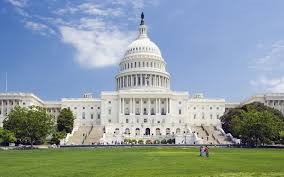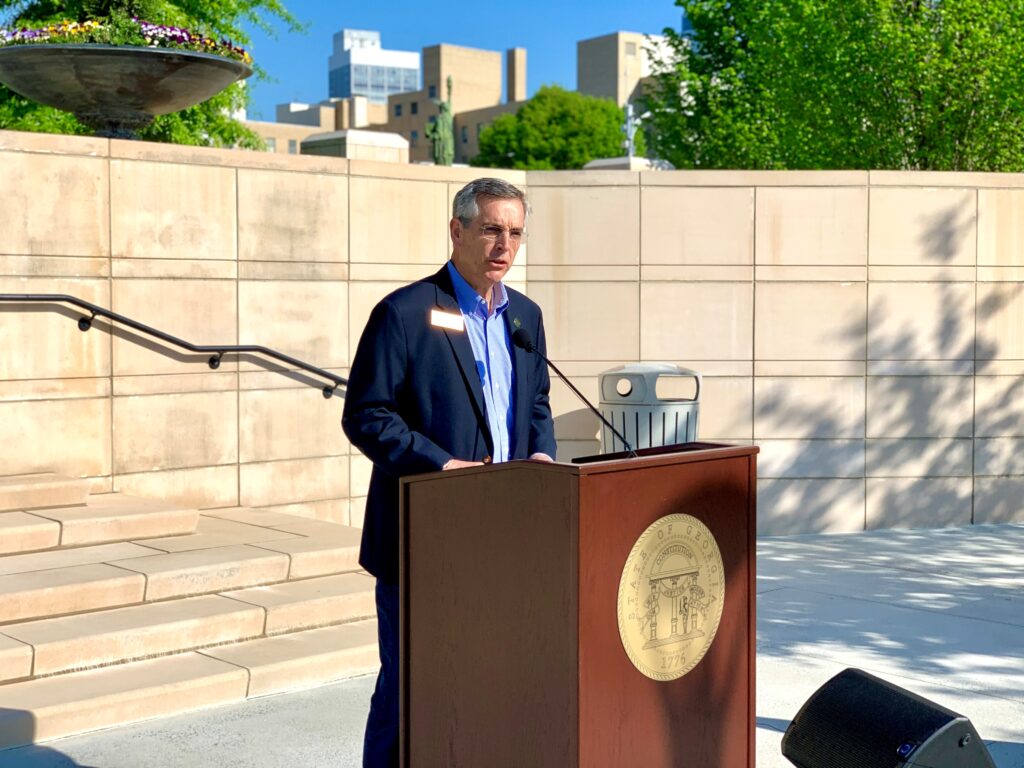Candidates debate in race for Gwinnett-area Congressional seat

Republican and Democratic candidates for the contested 7th Congressional District in Georgia divided sharply Sunday on issues like health care ahead of the June 9 primary election.
The 7th District, covering most of Gwinnett County and part of Forsyth County, drew a crowded field of candidates following the decision by current seat holder U.S. Rep. Rob Woodall, a Republican, not to seek re-election.
There are seven Republican and six Democratic candidates who qualified to run for the seat in early March. Hopefuls from each side faced each other in primary debates Sunday morning hosted by the Atlanta Press Club.
The 7th District race is expected to be close. In 2018, Woodall won his fourth term by less than 500 votes over Democrat Carolyn Bourdeaux, who is making a second run at the seat this year.
Some Republican candidates, however, challenged the idea that the 7th District is up for grabs. State Sen. Renee Unterman highlighted President Donald Trump’s high vote tally in 2016 and growing energy among Republican voters.
“I can tell you the base is revved up,” said Unterman, R-Buford. “Every single candidate knows it and is ready to get out and trounce this district.”
Democratic hopefuls, meanwhile, see an opening in the district after Bourdeaux’s close race and amid demographic changes in Gwinnett County spurred by a growing minority population.
“We are coming back to finish the job,” Bourdeaux said.
The Republicans
Republican candidates tackled hallmark issues like immigration enforcement, opposition to universal health care and praise for Trump’s handling of the coronavirus pandemic.
Dr. Rich McCormick, an emergency room doctor and former Marine pilot, said he favors the president’s decision to let state officials lead the local response, not the federal government.
“I think the less centralized we respond to this, the better,” McCormick said.
Others criticized the response from many state and local governments to impose business shutdowns and shelter-in-place orders amid the pandemic. Zachary Kennemore, a hotel night auditor, called the approach from some states to curbing the spread of the virus “downright tyrannical.”
“Commerce is important and they don’t have a right to stop our freedom of assembly,” Kennemore said.
Several Republican candidates also criticized China, where the pandemic originated. They included Mark Gonsalves, a real estate investor, who also targeted McCormick for not voting for Trump in 2016.
“We can’t recover the lives that were lost,” Gonsalves said. “But we certainly can let China know that there was a cost to losing those lives.”
On health care, several Republican contenders criticized the push by many Democratic lawmakers to broaden the country’s health-care system, particularly regarding universal health care and Medicare-for-all plans. Lynne Homrich, a former Home Depot executive, bashed the idea as “socialized medicine.”
“If you think socialized medicine works, just talk to some of the veterans I’ve talked to on the campaign trail,” Homrich said. “It doesn’t work.”
Republican candidates also called for tightening rules on immigration, particularly related to the process for migrating persons to obtain legal residency.
Lisa Noel Babbage, a DeKalb County school teacher and author, said federal immigration laws need strengthening but that people seeking to remain in the country legally should have a more consistent path for how to do so that Congress must enact.
“We’ve got to do something from the top down and meet in the middle,” Babbage said.
Unterman, a former nurse, said she backs the 287(g) information-sharing program between federal authorities and local law enforcement agencies, as well as control measures along the southern border.
“We need to finish building the wall and helping Trump,” Unterman said. “We need to enforce deportation.”
Some candidates during the debate touched on government spending and the growing national debt. Eugene Yu, a former U.S. Army military policeman and sheriff’s deputy in Augusta, said he would implement spending cuts if elected, but did not elaborate.
“I want to cut,” Yu said.
The Democrats
Democratic candidates delved into policy priorities for economic issues, particularly on tax breaks passed in recent years.
Bourdeaux, a Georgia State University professor who formerly worked in the state Senate budget office, said congressional lawmakers should pare back tax cuts, especially in light of large spending measures passed amid coronavirus.
“We need to look at all of the corporate tax breaks and corporate welfare that is riddled throughout our budget,” Bourdeaux said.
Several candidates called for the need to prop up local small businesses, both in general and specifically in the wake of coronavirus-prompted closures. John Eaves, a former chairman of the Fulton County Commission, said more emphasis should be placed on assisting disadvantaged businesses.
“I’d put a lot of effort in terms of supporting small businesses, particularly those that are minority-owned and women-owned,” Eaves said.
Some candidates also touched on income inequality issues such as advocating for an increase in the federal minimum wage to $15 per hour. Rashid Malik, a former IBM executive and author, said lawmakers should do more to increase salaries for women.
“Everybody should be treated equally with an equal economy,” Malik said.
Expanding health insurance and affordable health care were frequent refrains among Democratic candidates during the morning primary debate. Nabilah Islam, a campaign organizer and activist, noted her support for Medicare-for-all as a person who does not currently have health insurance.
“I believe health care is a human right and that everyone should have health care in this country,” Islam said.
That support for Medicare-for-all was not shared by all the Democratic candidates. State Sen. Zahra Karinshak, a former prosecutor, said she has heard from many constituents who would prefer to keep their existing private health insurance plans.
“I’m respecting that choice for them,” said Karinshak, D-Duluth. “But I agree with you that everyone needs to have access to affordable health care.”
Several Democratic candidates also advocated for sweeping environmental policies like the package of progressive climate change initiatives called the Green New Deal. State Rep. Brenda Lopez Romero, the first Latina elected to the General Assembly, said curbing fossil fuels would spur local growth in renewable energy jobs in Gwinnett County.
“We need to return to our global leadership role to protect our environment,” said Lopez Romero, D-Norcross.
Some Democratic contenders challenged Bourdeaux on her ability to win in the upcoming general election after losing to Woodall in 2018. Bourdeaux was also attacked for recession-era cuts done when she was a Senate budget staff member and accused her of not reaching out enough to the district’s minority communities.
Bourdeaux batted back, touting key endorsements by influential figures like U.S. Rep. John Lewis and recent outreach to local organizations.
